Contractual Capacity: Assessing the Ability to Legally Create Contracts
In the world of contract law, understanding the concept of contractual capacity is essential. Contractual capacity refers to the ability of an individual or entity to enter into a legally binding contract. It is important to assess the capacity of the parties involved in a contract to ensure that the agreement is enforceable and fair.
Determining contractual capacity involves evaluating various factors, such as age, mental competence, and legal status. Let’s delve deeper into these aspects to gain a comprehensive understanding of how contractual capacity is assessed.
1. Age: In most jurisdictions, individuals must reach a certain age to have the legal capacity to enter into contracts. This age is typically 18, known as the age of majority. Minors, those who are below the age of majority, generally lack contractual capacity, primarily due to their vulnerability and limited understanding of legal obligations. However, there are exceptions to this rule, such as contracts for necessities, which can be binding on minors.
2. Mental Competence: Mental capacity refers to an individual’s ability to understand the nature and consequences of entering into a contract. Factors such as mental illness, intellectual disability, or intoxication can impair a person’s mental capacity. In such cases, the affected individual may lack the ability to comprehend and appreciate the terms of the contract, rendering it void or voidable.
3. Legal Status: The legal status of an entity also plays a crucial role in assessing contractual capacity. For example, corporations, partnerships, and other business entities have separate legal personalities. It means that the contractual capacity of these entities is determined by their constitutive documents and the powers granted to them by law. Moreover, individuals acting on behalf of entities must have the authority to bind them legally.
It is important to note that even if a person or entity lacks contractual capacity, there are certain circumstances in which the contract may still be enforceable. For instance, if a party with contractual capacity ratifies a contract entered into by a person without capacity, it can be validated.
Assessing contractual capacity requires a careful evaluation of the circumstances surrounding the contract. It is crucial for solicitors and legal professionals to conduct a thorough analysis to ensure that all parties involved have the necessary capacity to enter into the agreement. By doing so, they can safeguard their clients’ interests and avoid potential legal challenges and pitfalls.
Navigating the world of contract law can be complex, and legal professionals must stay informed about the latest developments and best practices. If you’re interested in furthering your knowledge and enhancing your expertise, check out some of our related articles:
1. Navigating Legal Challenges and Pitfalls in Your Practice: This article offers valuable insights into the common legal challenges that solicitors might face in their practice and provides strategies to overcome them.
2. Barrister vs. Solicitor: A Comprehensive Comparison: If you’re interested in understanding the differences between barristers and solicitors, this article provides a comprehensive overview to help you make informed decisions about your legal career.
3. Understanding the SRA Competence Statement: A Guide for Solicitors: The Solicitors Regulation Authority (SRA) Competence Statement outlines the standards of competence expected from solicitors. This article is a guide to help you navigate and understand this important document.
4. Exploring Different Solicitor Specializations: Finding Your Niche: Choosing a specialization can be a challenging decision for solicitors. This article explores various solicitor specializations, helping you find your area of expertise and passion.
5. Top Recommendations for Law Schools in the UK: If you’re considering a career in law, selecting the right law school is crucial. This article provides recommendations for top law schools in the UK, ensuring you receive high-quality legal education.
Understanding contractual capacity is fundamental for solicitors and legal professionals dealing with contract law. By assessing the ability of parties to create legally binding contracts, solicitors can ensure fair and enforceable agreements. Stay updated with legal developments and best practices by exploring our related articles and enhance your expertise in contract law.
Remember to always consult with a qualified solicitor for professional advice tailored to your specific situation.
